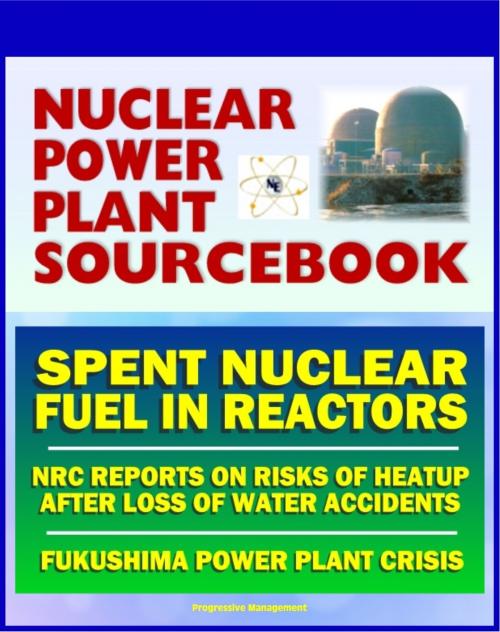2011 Nuclear Power Plant Sourcebook: Spent Nuclear Fuel and the Risks of Heatup After the Loss of Water - NRC Reports - Crisis at Japan's TEPCO Fukushima Daiichi Power Plant
Nonfiction, Science & Nature, Science, Physics, General Physics, Social & Cultural Studies, Political Science| Author: | Progressive Management | ISBN: | 9781458091994 |
| Publisher: | Progressive Management | Publication: | March 16, 2011 |
| Imprint: | Smashwords Edition | Language: | English |
| Author: | Progressive Management |
| ISBN: | 9781458091994 |
| Publisher: | Progressive Management |
| Publication: | March 16, 2011 |
| Imprint: | Smashwords Edition |
| Language: | English |
The crisis at the TEPCO Fukushima Daiichi Nuclear Power Station in Japan following the great earthquake and tsunami of March 11, 2011 has raised important issues about the safety of spent nuclear fuel rod storage, especially those located at the top of boiling water reactor (BWR) units. At press time, TEPCO is reporting that water levels in the spent nuclear fuel pools located above the reactors in the Number 3 and Number 4 units of the Fukushima Daiichi Power Station are heating up and running low on water. There is extreme concern that the fuel rods in those pools could overheat and possibly release large amounts of radiation. After a brief overview of the handling of spent nuclear fuels, we present two major studies for the Nuclear Regulatory Commission (NRC) which deal with the hazards of reactor spent fuel pools. The first report, by the Sandia Laboratories, specifically addresses the type of situation faced by TEPCO at Fukushima with boiling water reactors (BWR). The second report, by the Brookhaven National Laboratory, characterizes the radiological risks posed by storage of spent reactor fuel at commercial reactors. Finally, we reproduce a report by the GAO about the safety of spent nuclear fuel.
Allen Benjamin and others, writing in the Sandia report, state: "Analysis of spent fuel heatup following a hypothetical accident involving drainage of the storage pool is presented. Computations based upon a new computer code called SFUEL have been performed to assess the effect of decay time, fuel element design, storage rack design, packing density, room ventilation, drainage level, and other variables on the heatup characteristics of the spent fuel and to predict the conditions under which clad failure will occur. It has been found that the likelihood of clad failure due to rupture or melting following a complete drainage is extremely dependent on the storage configuration and the spent fuel decay period, and that the minimum prerequisite decay time to preclude clad failure may vary from less than 10 days for some storage configurations to several years for others."
The report discusses emergency aspects of pool water loss relevant to the Japanese situation. "An alternative way to maintain coolability, at least on a temporary basis, would be to provide an emergency water spray of sufficient intensity to remove the decay heat by its latent heat of vaporization. The water supply could be available from onsite hydrants, from onsite storage tanks, from remote portable storage tanks, or, preferably, from a combination of onsite and remote sources in order to reduce the risk of unavailability. Facility personnel would presumably be available to set up fire hoses and initiate the spray in the event of a complete power failure, and the spray would be continued until the source of the leak could be repaired."
The abstract for the BNL report reads: "This investigation provides an assessment of the likelihood and consequences of a severe accident in a spent fuel storage pool - the complete draining of the pool. Potential mechanisms and conditions for failure of the spent fuel, and the subsequent release of the fission products, are identified. Two older PWR and BWR spent fuel storage pool designs are considered based on a preliminary screening study which tried to identify vulnerabilities. Internal and external events and accidents are assessed. Conditions which could lead to failure of the spent fuel Zircaloy cladding as a result of cladding rupture or as a result of a self-sustaining oxidation reaction are presented. Propagation of a cladding fire to older stored fuel assemblies is evaluated. The uncertainties in the risk estimate are large, and areas where additional evaluations are needed to reduce uncertainty are identified."
The crisis at the TEPCO Fukushima Daiichi Nuclear Power Station in Japan following the great earthquake and tsunami of March 11, 2011 has raised important issues about the safety of spent nuclear fuel rod storage, especially those located at the top of boiling water reactor (BWR) units. At press time, TEPCO is reporting that water levels in the spent nuclear fuel pools located above the reactors in the Number 3 and Number 4 units of the Fukushima Daiichi Power Station are heating up and running low on water. There is extreme concern that the fuel rods in those pools could overheat and possibly release large amounts of radiation. After a brief overview of the handling of spent nuclear fuels, we present two major studies for the Nuclear Regulatory Commission (NRC) which deal with the hazards of reactor spent fuel pools. The first report, by the Sandia Laboratories, specifically addresses the type of situation faced by TEPCO at Fukushima with boiling water reactors (BWR). The second report, by the Brookhaven National Laboratory, characterizes the radiological risks posed by storage of spent reactor fuel at commercial reactors. Finally, we reproduce a report by the GAO about the safety of spent nuclear fuel.
Allen Benjamin and others, writing in the Sandia report, state: "Analysis of spent fuel heatup following a hypothetical accident involving drainage of the storage pool is presented. Computations based upon a new computer code called SFUEL have been performed to assess the effect of decay time, fuel element design, storage rack design, packing density, room ventilation, drainage level, and other variables on the heatup characteristics of the spent fuel and to predict the conditions under which clad failure will occur. It has been found that the likelihood of clad failure due to rupture or melting following a complete drainage is extremely dependent on the storage configuration and the spent fuel decay period, and that the minimum prerequisite decay time to preclude clad failure may vary from less than 10 days for some storage configurations to several years for others."
The report discusses emergency aspects of pool water loss relevant to the Japanese situation. "An alternative way to maintain coolability, at least on a temporary basis, would be to provide an emergency water spray of sufficient intensity to remove the decay heat by its latent heat of vaporization. The water supply could be available from onsite hydrants, from onsite storage tanks, from remote portable storage tanks, or, preferably, from a combination of onsite and remote sources in order to reduce the risk of unavailability. Facility personnel would presumably be available to set up fire hoses and initiate the spray in the event of a complete power failure, and the spray would be continued until the source of the leak could be repaired."
The abstract for the BNL report reads: "This investigation provides an assessment of the likelihood and consequences of a severe accident in a spent fuel storage pool - the complete draining of the pool. Potential mechanisms and conditions for failure of the spent fuel, and the subsequent release of the fission products, are identified. Two older PWR and BWR spent fuel storage pool designs are considered based on a preliminary screening study which tried to identify vulnerabilities. Internal and external events and accidents are assessed. Conditions which could lead to failure of the spent fuel Zircaloy cladding as a result of cladding rupture or as a result of a self-sustaining oxidation reaction are presented. Propagation of a cladding fire to older stored fuel assemblies is evaluated. The uncertainties in the risk estimate are large, and areas where additional evaluations are needed to reduce uncertainty are identified."















